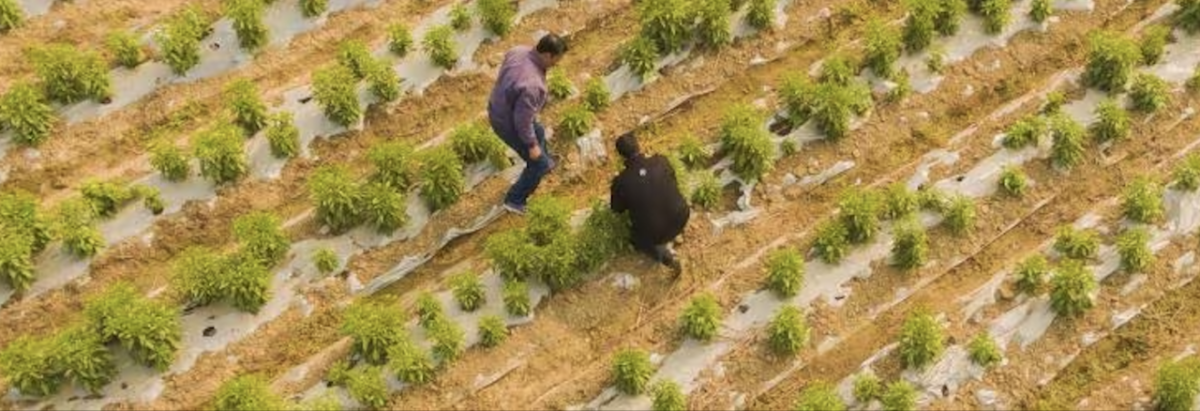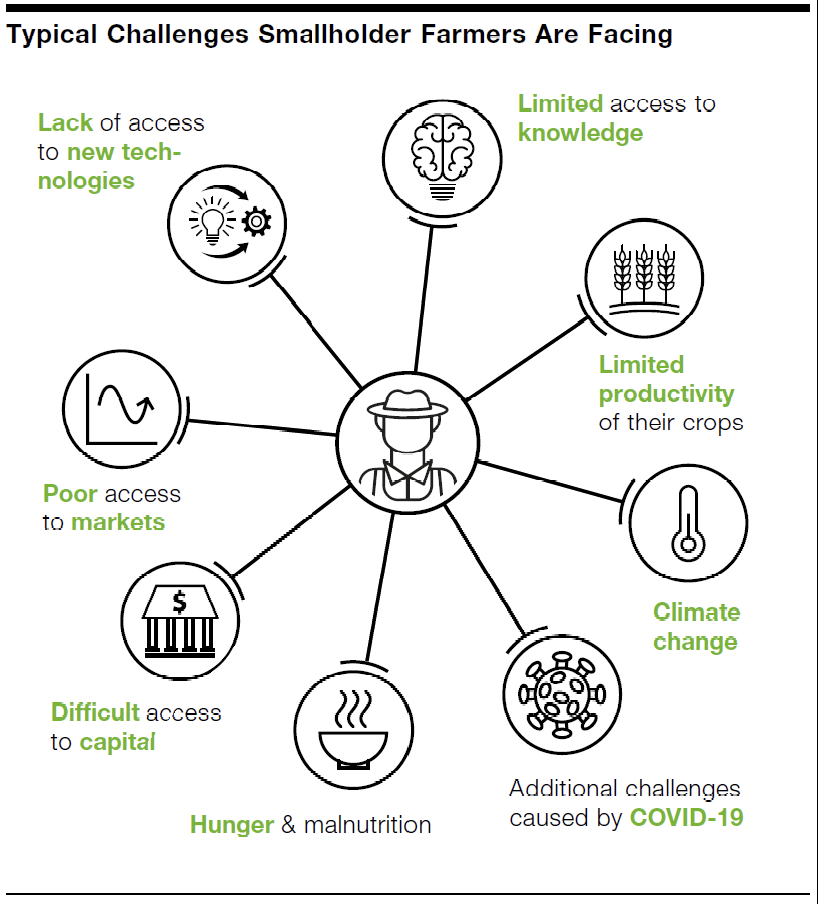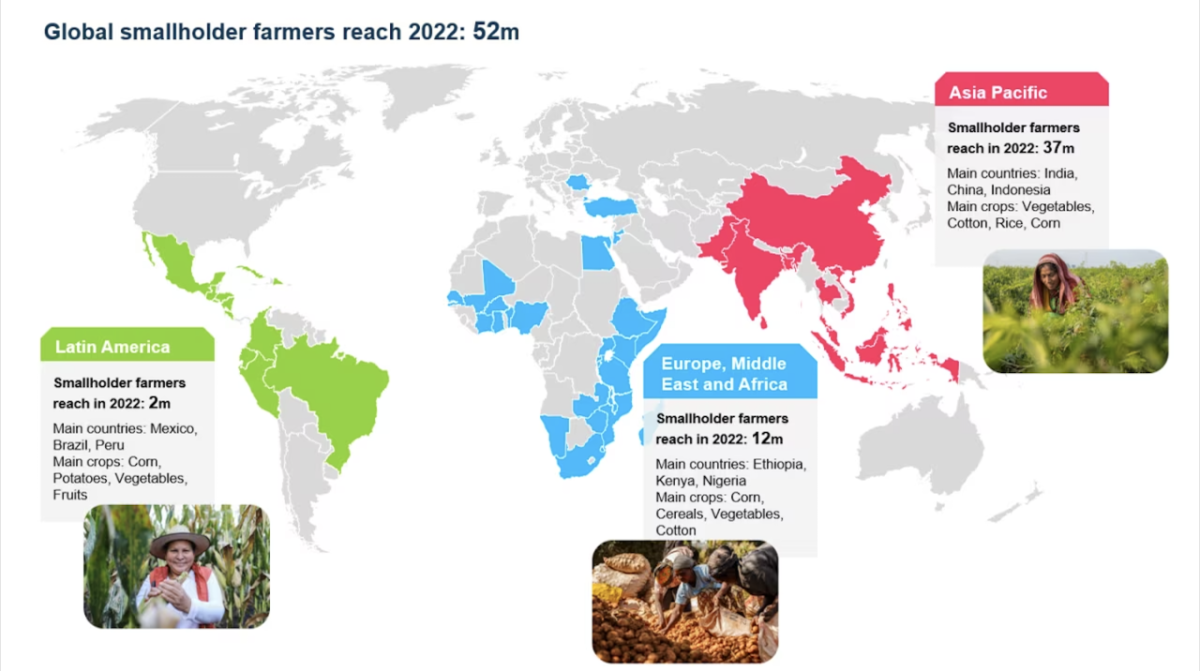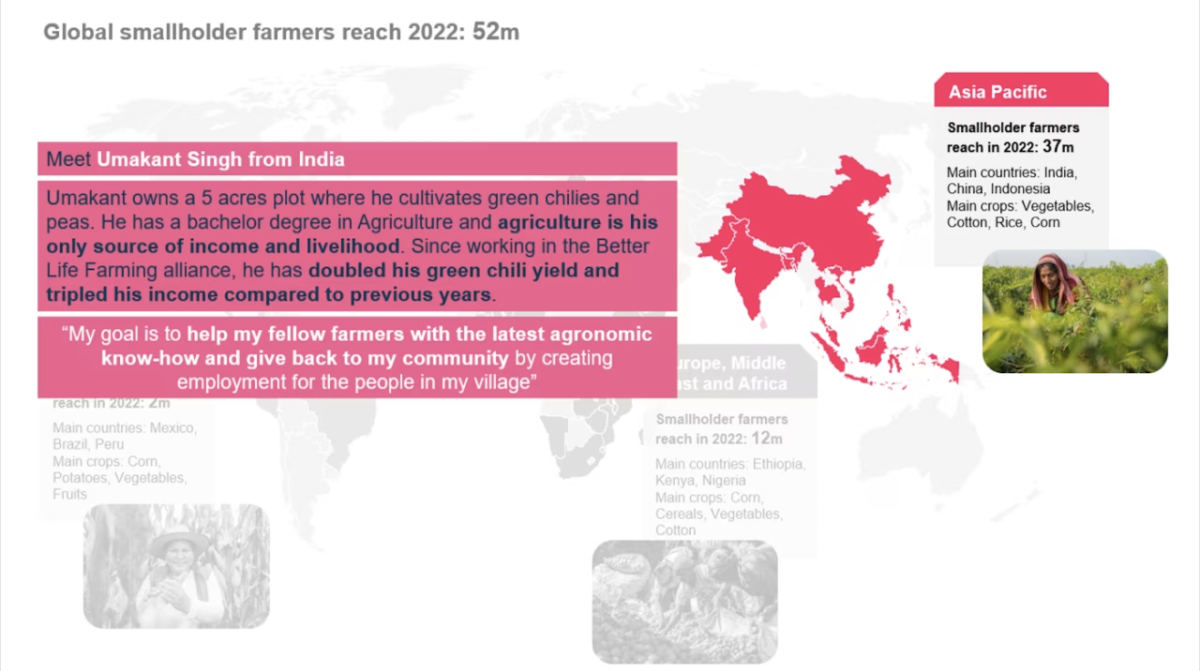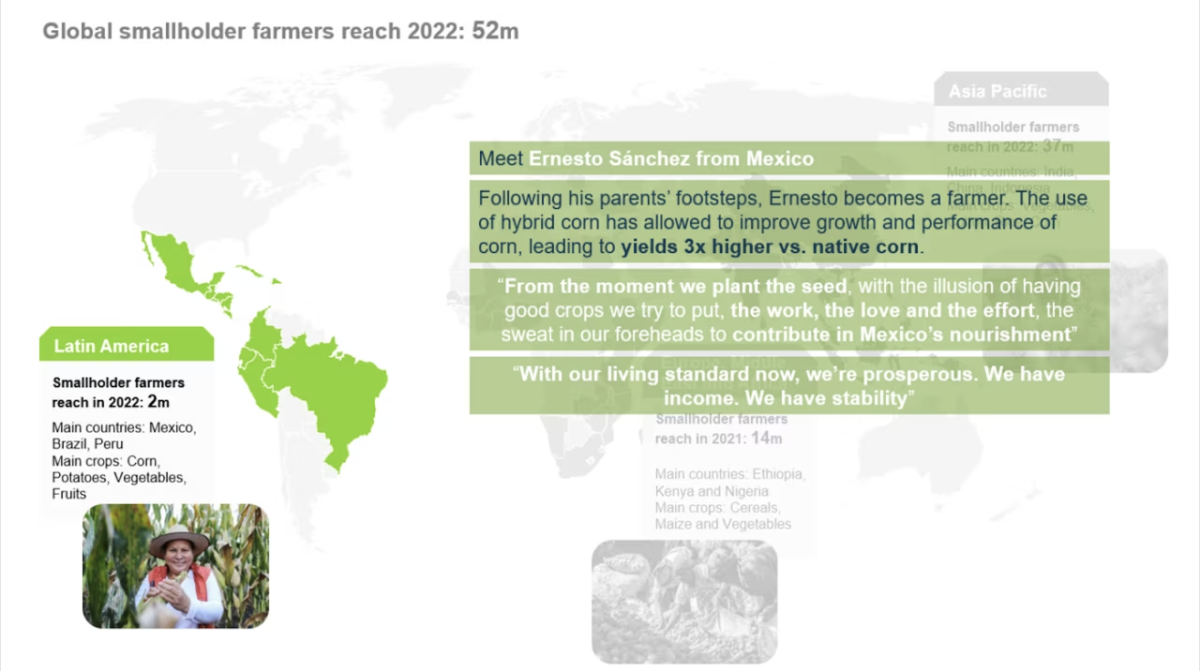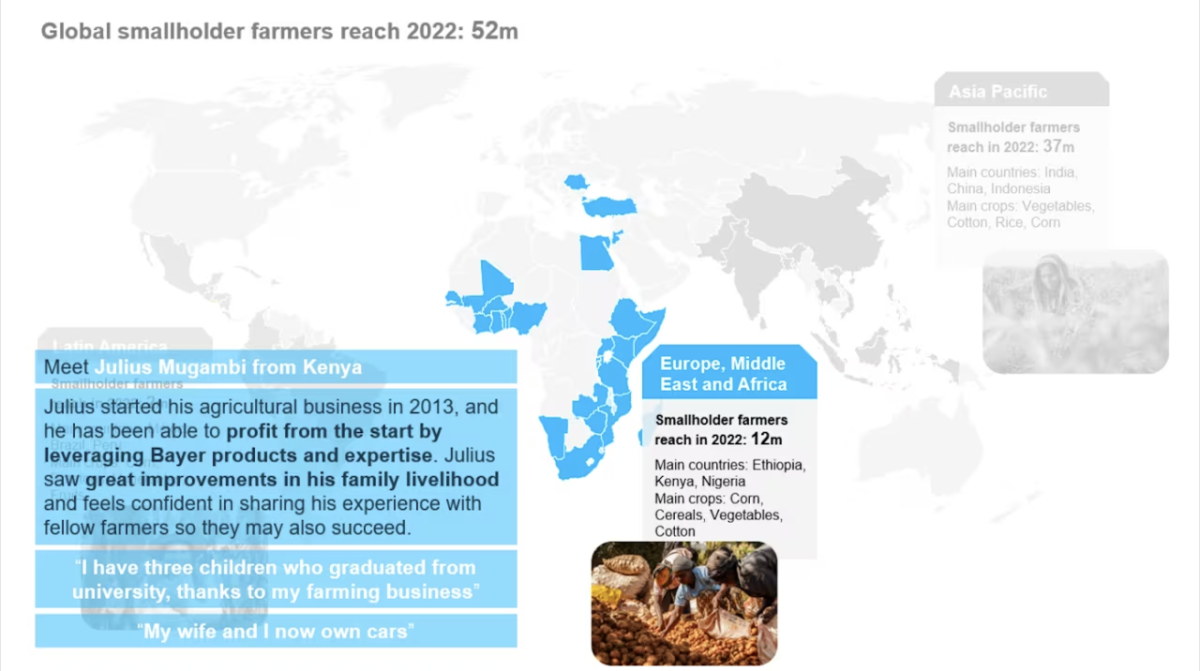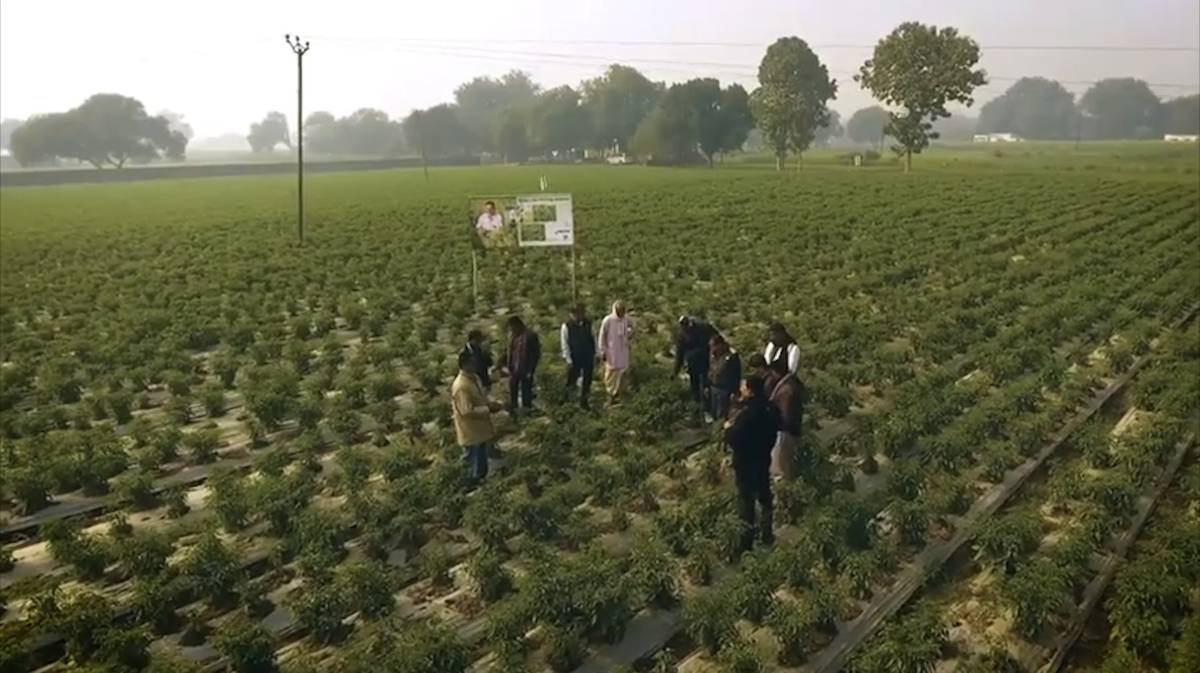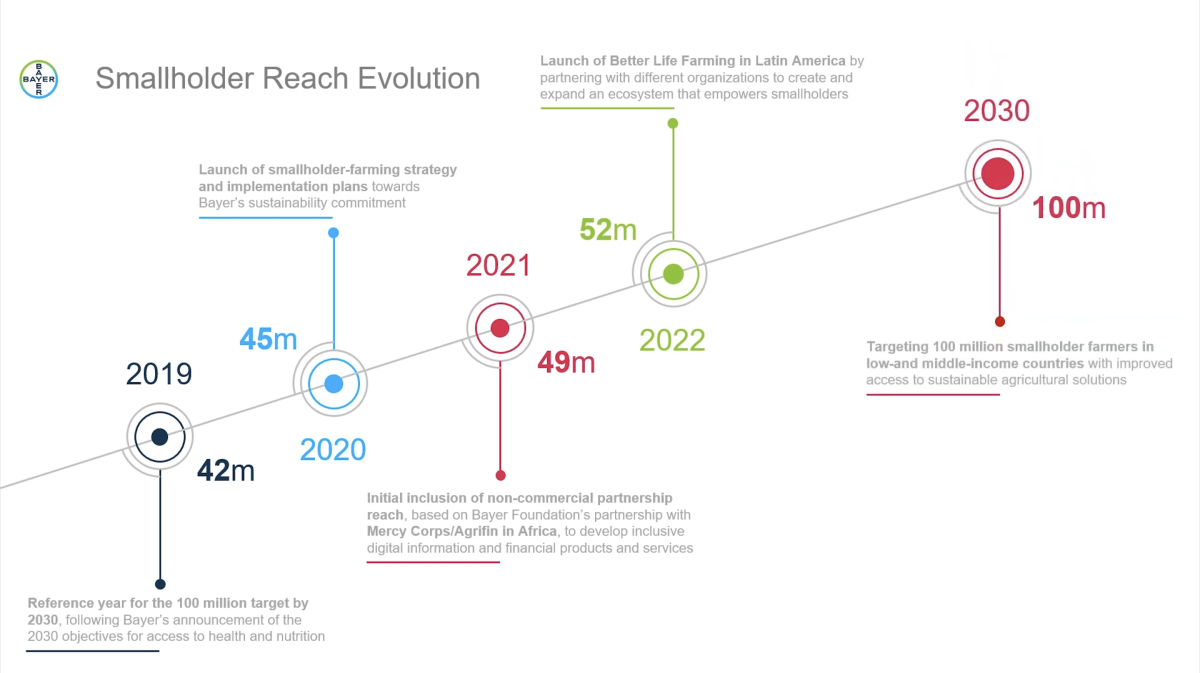Bayer: Empowering SmallHolder Farmers
Approximately 97 percent of the world’s farmers farm on less than 10 hectares (about 25 acres) of land. They represent approximately 550 million smallholder farmers in low- and middle-income countries (LMICs), especially across Asia and Africa. These farmers, many of them owning under 2 hectares (about 5 acres), feed more than half of the population in these regions. Therefore, it’s no exaggeration to say that smallholder farmers play a big role in global agriculture and food security.
In line with the UN Sustainable Development Goals (SDGs), we are committed to contribute to feeding the growing population while respecting planetary boundaries. We start at the farms of those who form the backbone of food security in many rural regions of the world. Smallholder farmers’ efforts to escape poverty and feed their families are our efforts as well. We want to help them thrive, empower them to build viable and sustainable businesses, with ripple effects on their rural communities. We want to make a difference – not only in the lives of smallholder farmers but ultimately our all livelihood.
Empowering smallholder farmers is crucial for food security. Together with our partners, we strive to unleash the potential of individual smallholders whose success ultimately contributes to the ecosystem success. Sustainability increased smallholder incomes will in turn benefit the inclusive development of low- and middle-income countries.
D Narain , Global Lead Smallholder Farming
Smallholder Needs
Many of these smallholder farmers are facing significant challenges. Their yields are often low because they do not have access to high-quality crops and practical knowledge about more productive and environmentally friendly cultivation methods. Often, they do not have affordable financing opportunities and access to markets on which they can sell their products at appropriate prices. At the same time, smallholder farmers are also highly exposed to the impacts of climate change and increasingly to harvest losses. For all these reasons, they are often not able to achieve a stable income through farming.
Smallholder Strategy
As the world’s leading agriculture company, we will support a total of 100 million smallholder farmers in LMICs by 2030 by improving their access to agricultural products, services, and partnerships. To achieve this, we are increasing the range of our commercial efforts and strategic initiatives tailored to the needs of smallholder farmers. Our strategy to strengthen smallholder farmers is embedded in our regional commercial strategies.
We are successively expanding our product and service portfolio for smallholder farmers, including innovative business models and digital solutions across the entire crop system. This includes solutions from the areas of digital farming and market access, a modified product portfolio, biotechnological solutions, and the formation of partnerships along the value chain.
We aim to create market models that reduce business risks for all partners in the value chain, including smallholder farmers. This is implemented by helping smallholder farmers gain access to the agricultural value chain and increase productivity and income, as well as by creating resilience to ensure the long-term food security of smallholder farmers, their families, and rural regions in the LMICs.
Targets & Achievements
By 2030, we will be supporting 100 million smallholder farmers in LMICs with products, services, and partnerships. We want to enable them to produce enough quality food for themselves and others. While we know improving the livelihoods of smallholder farmers will improve food security and quality of life in their communities, we also know it will help us grow our business.
Globally, we generated around €2.3bn of sales with smallholder farmers in 2022, which represents roughly 9% of Crop Science’s divisional sales. We estimate our Smallholder farming business to double by 2030 (vs. reference year 2019 of ~€1.7bn€).
In 2022 already, together with our partners, we supported 52 million smallholder farmers in LMICs with our products and services – 3 million more than in the previous year. We achieved this by significantly expanding business activities, especially in Asia/Pacific.
The Bayer Foundation funds the Digital Farmer II program of our partner Mercy Corps Agrifin together with the Bill & Melinda Gates Foundation. This leverages the spread of digital technologies to develop more efficient digital information and financial products and services for smallholder farmers. The goal is for the program to serve up to five million farmers in Nigeria, Kenya, and Ethiopia by 2025. In 2022, we reached some 950,000 smallholder farmers via non-commercial partnerships.
Read more about Our Targets & Our Progress | Bayer global
Read more about the Smallholder Reach Methodology in the Method Paper Smallholder Reach (PDF)
To scale our efforts, we build our engagement with smallholder farmers on the key strategic initiatives of Smallholder-centric Solutions, Value-chain Partnerships, and Digital Solutions – to ultimately unleash their farming potential and improve smallholder livelihoods.
Designing smallholder-centric solutions is key to enable more smallholder farmers to have better yields at their crops. These solutions allow to attain high-quality seeds for main crops which endure better though environments and pests, while creating more affordable and effective crop protection products.
Through a deep understanding and close collaboration with smallholder farmers we aim to create lasting partnerships that provide access to training, advice, and solutions that are needed to harness the opportunities of commercial farming, while also establishing inclusive business models that help connect smallholder farmers to the agricultural value chain.
To help them increase their productivity while heightening land stewardship, we need to create, test and scale digital solutions. Augmenting the access and use of new technologies is essential to overcome extreme weather conditions and pests, while improving income and food security.
We’re working directly with smallholder farmers around the world to make a massive impact, together.
For more information, please contact:
Global Smallholder Farming
Crop Science Division, Monheim, Germany
Email: smallholder@bayer.com
View original content here.

